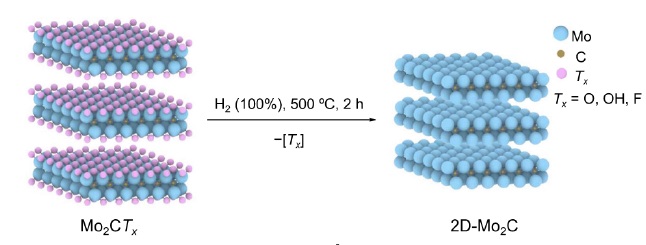Ask for a reprint
email :
* Give your email
2021
ACL
|
Hui Zhou, Zixuan Chen, Evgenia Kountoupi, Athanasia Tsoukalou, Paula M.Abdala, Pierre Florian, Alexey Fedorov, Christoph R.Müller, 'Two-dimensional molybdenum carbide 2D-Mo2C as a superior catalyst for CO2 hydrogenation', Nat. Commun. 12 5510 (2021) doi:10.1038/s41467-021-25784-0
Early transitional metal carbides are promising catalysts for hydrogenation of CO2. Here, a two-dimensional (2D) multilayered 2D-Mo2C material is prepared from Mo2CTx of the MXene family. Surface termination groups Tx (O, OH, and F) are reductively de-functionalized in Mo2CTx (500 °C, pure H2) avoiding the formation of a 3D carbide structure. CO2 hydrogenation studies show that the activity and product selectivity (CO, CH4, C2–C5 alkanes, methanol, and dimethyl ether) of Mo2CTx and 2D-Mo2C are controlled by the surface coverage of Tx groups that are tunable by the H2 pretreatment conditions. 2D-Mo2C contains no Tx groups and outperforms Mo2CTx, β-Mo2C, or the industrial Cu-ZnO-Al2O3 catalyst in CO2 hydrogenation (evaluated by CO weight time yield at 430 °C and 1 bar). We show that the lack of surface termination groups drives the selectivity and activity of Mo-terminated carbidic surfaces in CO2 hydrogenation.
|

|